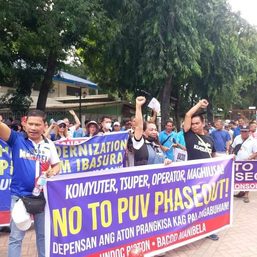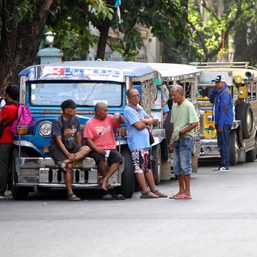SUMMARY
This is AI generated summarization, which may have errors. For context, always refer to the full article.

MANILA, Philippines – The Land Transportation Franchising and Regulatory Board (LTFRB) approved a P1 provisional fare increase for jeepneys nationwide.
In a decision on Tuesday, October 3, the regulatory board agreed to grant the provisional increase while it deliberates on a petition to raise fares by P5.
The fare hike will take effect on Sunday, October 8, and will apply to both modern and traditional jeepneys. The increase will raise minimum fares of traditional jeepneys from P12 to P13, and modern jeepneys from P14 to P15.
The petition was put forward by three major transportation groups: Pangkalahatang Sanggunian Manila & Suburbs Drivers Association Nationwide or PASANG MASDA, Alliance of Transport Operators and Drivers Association of the Philippines or ALTODAP, and Alliance of Concerned Transport Organization or ACTO.
The groups also petitioned to add P5 for the first four kilometers and to adjust the fare for every succeeding kilometer by P1, which will be tackled by the LTFRB in another hearing on November 7.
In the meantime, the temporary increase is expected to help jeepney operators cope with rising fuel costs. Gas prices have continued to soar over recent months, prompting the government to hand out P2.95 billion in fuel subsidies for public utility vehicle operators. (READ: Struggling PUV drivers can’t get fuel subsidies due to election spending ban)
The LTFRB deemed that commuters could bear the fare hike since they have “an increased paying capacity resulting from the minimum wage increase implemented in the NCR last 30 June 2023.” The National Center for Commuters Safety and Protection also supported the provisional increase.
LTFRB Chairman Teofilo Guadiz III previously said that the agency has been considering a fare hike since mid-September as jeepney drivers struggled to make ends meet.
Although the regulatory board was poised to grant a fare hike, it said that it still needed the National Economic and Development Authority to study when and by how much to hike fares – lest the higher transportation costs push up inflation.
Meanwhile, the Move as One Coalition questioned whether the provisional fare increase was the best course of action for jeepney operators and commuters. The group instead called on the government to use the P1.28 billion allotted for the Service Contracting Program under the 2023 national budget, which has yet to be utilized.
“Nananawagan ang Move As One Coalition sa administrasyong Marcos ng agaran at maayos na implementasyon ng P1.28 bilyong Service Contracting Program na ipinangako ng pamahalaan. Sampung buwan nang hindi gumagalaw ang pondo’t programang ito na sana’y nakakatulong sa libo-libong mga tsuper at milyon-milyong mga pasahero sa krisis na ito,” the group said in a statement.
(The Move As One Coalition calls on the Marcos administration for the immediate and proper implementation of the promised P1.28-billion Service Contracting Program. This fund and program, which could have been assisting thousands of drivers and millions of passengers, have been stagnant for ten months amid this crisis.) – Rappler.com
Add a comment
How does this make you feel?







![[Under 3 Minutes] When will we see modern jeepneys on the road?](https://www.rappler.com/tachyon/2024/04/francisco-motors-modern-jeepney-prototype-1.jpg?resize=257%2C257&crop=590px%2C0px%2C1012px%2C1012px)

There are no comments yet. Add your comment to start the conversation.